THE PHILLIP GOODHAND-TAIT STORY
Phillip Goodhand-Tait was born in Hull, Yorkshire on January 3rd, 1945. Goodhand-Tait is his real surname, although at school and into the mid-60s, he was known as Phil Tait. His mother taught piano and his father was an active Trades Unionist.
Pianist Winifred Atwell was one of the most successful entertainers in Britain during 1955 and '56 playing piano rags and boogies. Tommy Steele began to popularise rock 'n' roll with his recordings of "Rock with the caveman" and "Singing the blues". So not surprisingly, Phillip began trying to imitate them and playing the piano by ear.
In 1957 the family moved south to Guildford, Surrey where Phillip attended Pewley school. The most memorable place at Pewley was the class form room which also happened to be the music room. At breaks between lessons, Phillip was usually to be found pounding the school piano. Before taking his GCEs, the school moved to Burpham and was renamed George Abbot school.
Outside of school, Phillip was also a contemporary of guitarist John Renbourn. Both were taught classical music privately by Frank J.Winslade ARCM, a rather eccentric Englishman, given to cycling around Guildford wearing a black beret. He instilled in his piano pupils a strong sense of rhythm, by pounding his hands in octaves on the bass notes of the piano, as they played through their pieces. This was to remain a part of the Goodhand-Tait piano-style throughout his playing and composing career.
Despite progressing through ACRSM exams in pianoforte and theory of music, the lure of rock 'n' roll was greater, and Phillip spent much of his time at school studying Buddy Holly recordings instead of academic subjects. At school, three of the class of '60 formed a group called The Royphillians! Before long, Phillip was singing in "beat groups" several nights every week at youth centres and dance halls throughout Surrey and Hampshire under names such as Phill Tone and the Vibrants until in 1961, they named themselves Phill and the Stormsville Shakers, a group formed with Paul Demers on drums, Ivor Shackleton playing guitar, and Kirk Riddle, bass. "Stormsville" was the title of a 1960 Johnny & the Hurricanes album and "Shakers" was meant to indicate the frantic nature of their performances.
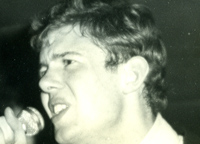 In 1960, Phillip was asked to "supply a five-piece band for two half-hour periods of playing at a dance" in Woking for a fee of £4. The Surrey Advertiser newspaper, reviewing the first meeting of Sandhurst Youth Club in 1961, recorded that music was provided by Phil Tone and the Vibrants "from Guildford and only six weeks old"! In 1960, Phillip was asked to "supply a five-piece band for two half-hour periods of playing at a dance" in Woking for a fee of £4. The Surrey Advertiser newspaper, reviewing the first meeting of Sandhurst Youth Club in 1961, recorded that music was provided by Phil Tone and the Vibrants "from Guildford and only six weeks old"!
The same newspaper, in December 1962 described the Stormsville Shakers "striving to follow the early rock and rhythm 'n' blues style of Gene Vincent, Chuck Berry and Ray Charles", and giving their services free to raise money for Oxfam. In 1964 the Shakers played the Ricky Tick club circuit, (famous for engaging Cyril Davies, Alexis Korner, the Yardbirds and Rolling Stones,) and backed US blues pianist Memphis Slim. The Surrey Advertiser reported that the (by now professional) Stormsville Shakers had added two tenor sax players to a bass, lead guitar and drums line-up, and that Phillip was playing an electric piano as well as composing some of the band's repertoire.
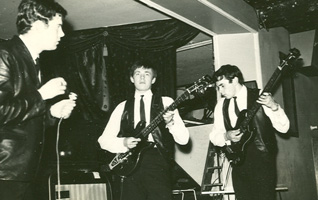 He was inspired to write songs after working with talented songwriter Chris Andrews. Chris, already writing successfully for Adam Faith, brought the Shakers an idea for a song, lyrics sketched on the back of a cornflakes packet. The band worked on the song, arranging it for two saxes and Chris introduced an on-beat, ska-type rhythm, which was familiar in Blue-Beat clubs frequented by 'mods' at that time. The song was well-received by audiences even in the critical, black, All-Nighter clubs. Chris financed a recording at Regent Sound studios and the Shakers knew they had found their hit record. All that was needed was a record company to release it. Soon after however, Chris came to see them, embarrassed after meeting with his agent and manager, Evy Taylor. "Why give the song to an unknown group?" he'd been told. Phill and the Stormsville Shakers, though bitterly disappointed, continued to perform the song around the clubs in the vain hope that somehow their version would be first to be released. During a four nights-for-£90 booking at Pete Stringfellow's Mojo Club in Sheffield, Sandie Shaw's version of the song, "Long Live Love" was released and in May 1965 it became her biggest success, a number one record in the UK Top 10. He was inspired to write songs after working with talented songwriter Chris Andrews. Chris, already writing successfully for Adam Faith, brought the Shakers an idea for a song, lyrics sketched on the back of a cornflakes packet. The band worked on the song, arranging it for two saxes and Chris introduced an on-beat, ska-type rhythm, which was familiar in Blue-Beat clubs frequented by 'mods' at that time. The song was well-received by audiences even in the critical, black, All-Nighter clubs. Chris financed a recording at Regent Sound studios and the Shakers knew they had found their hit record. All that was needed was a record company to release it. Soon after however, Chris came to see them, embarrassed after meeting with his agent and manager, Evy Taylor. "Why give the song to an unknown group?" he'd been told. Phill and the Stormsville Shakers, though bitterly disappointed, continued to perform the song around the clubs in the vain hope that somehow their version would be first to be released. During a four nights-for-£90 booking at Pete Stringfellow's Mojo Club in Sheffield, Sandie Shaw's version of the song, "Long Live Love" was released and in May 1965 it became her biggest success, a number one record in the UK Top 10.
The Stormsville Shakers continued to work the Ricky Tick circuit, and the Flamingo, All-Nighter and Marquee clubs in London's Wardour Street during the mid-60s, alongside visiting American artists such as Sonny Boy Williamson, Rufus Thomas, Jimmy Reed, Howling Wolf and Screaming Jay Hawkins. Similarly, British artists like the Paramounts (later to become Procol Harum), Georgie Fame, John Mayall, Davy Jones (later David Bowie), Graham Bond, Zoot Money, Chris Farlowe, the Animals, the Moody Blues and Cliff Bennett, played the same venues, paying their dues and waiting for the big break via a recording contract. It was working with touring American acts that was to provide Phillip and his band, with their next attempt to find an elusive hit song.
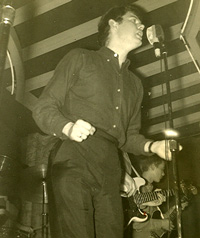 Speciality Record's, piano-pounding rock 'n' roll legend, Larry Williams, embarked on his first British tour ten years after successes with r'n'r classics such as "Dizzy Miss Lizzy", "Short Fat Fannie" and "Bony Maronie". Larry brought with him Johnny 'Guitar' Watson from the States, but he needed a UK backing band. Phill and the Stormsville Shakers got the job, and played their hearts out. Their reward was two days and nights recording two albums with Larry Williams at Decca Records (Decca LK 4691) and in the Marquee club recording studio. They were paid £200 in total and weren't even credited on one of the LPs, released on the Sue label (Sue ILP 922). Larry wrote to Phillip from Los Angeles and expressed his disappointment. Speciality Records in America meanwhile, enjoyed greater success with recordings by his stable-mate, Little Richard. Speciality Record's, piano-pounding rock 'n' roll legend, Larry Williams, embarked on his first British tour ten years after successes with r'n'r classics such as "Dizzy Miss Lizzy", "Short Fat Fannie" and "Bony Maronie". Larry brought with him Johnny 'Guitar' Watson from the States, but he needed a UK backing band. Phill and the Stormsville Shakers got the job, and played their hearts out. Their reward was two days and nights recording two albums with Larry Williams at Decca Records (Decca LK 4691) and in the Marquee club recording studio. They were paid £200 in total and weren't even credited on one of the LPs, released on the Sue label (Sue ILP 922). Larry wrote to Phillip from Los Angeles and expressed his disappointment. Speciality Records in America meanwhile, enjoyed greater success with recordings by his stable-mate, Little Richard.
In 1966 the Stormsville Shakers played the Palladium club in Paris and in April of that year, French record producer, Claude Bolling directed their first record release on the Odeon/EMI label (MEO 148). It was an EP of four Phillip Goodhand-Tait compositions.
This was to bring Phillip to the notice of Dick James, the publisher of Northern Songs and Beatles fame, who signed him to a three-year exclusive songwriting agreement. Parlophone Records in England released The Stormsville Shakers with Phillip Goodhand-Tait's first single on May 6th, "I'm gonna put some hurt on you" (Parlophone R5448) recorded at R.G.Jones' Oak Records studio in Morden. The single made number 40 in the Melody Maker top 50 charts in June, 1966.
Subsequent singles, "No Problem" (Parlophone R5498 released 26th August) and "You can't take love" produced by Ken Pitt, (Parlophone R5547) who had success with David Bowie, failed to improve on this minor success.
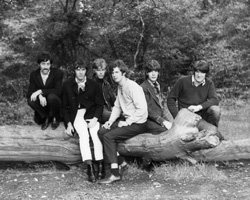 During 1967 and 68, the last rites for Phillip Goodhand-Tait & the Stormsville Shakers involved a name change to Circus. Mike d'Abo, who had replaced Paul Jones as lead singer in the Manfred Mann group, agreed to finance and produce Circus for two more single releases. The first (Parlophone R5633) was a Goodhand-Tait composition "Gone are the songs of yesterday" which was to prove more lucrative as 'B' side of Love Affair's number one hit "Everlasting love". The second, comprising two PG-T songs in psychedelic vein, ("Do you dream" and "House of wood" Parlophone R 5672), marked Phillip's final appearance with the group from Guildford for many, many years. During 1967 and 68, the last rites for Phillip Goodhand-Tait & the Stormsville Shakers involved a name change to Circus. Mike d'Abo, who had replaced Paul Jones as lead singer in the Manfred Mann group, agreed to finance and produce Circus for two more single releases. The first (Parlophone R5633) was a Goodhand-Tait composition "Gone are the songs of yesterday" which was to prove more lucrative as 'B' side of Love Affair's number one hit "Everlasting love". The second, comprising two PG-T songs in psychedelic vein, ("Do you dream" and "House of wood" Parlophone R 5672), marked Phillip's final appearance with the group from Guildford for many, many years.
In his book "Beat Merchants" (published in the UK 1995 by Blandford, a Cassell plc imprint) on the origins, history, impact and rock legacy of the 1960s British Pop Groups, Alan Clayson points out that after making "scant headway as performers, Graham Gouldman, Peter Lee Stirling and Phillip Goodhand-Tait were three who found their feet as jobbing songwriters. Unable to get anywhere with his group the Stormsville Shakers, Goodhand-Tait's time was to come in 1969 with three hits on the trot for "Love Affair".
"Hit group requires hit songs," read the Melody Maker ad placed by John Cokell and Sid Bacon, for their new group, Love Affair. Phillip sent them his piano and vocal demo of "Gone are the songs of yesterday". Later he heard "Everlasting love" by Love Affair (CBS 3125) played frequently on Radio Caroline, until shortly after Christmas 1967, it reached no.1 in the UK best-selling records charts. Only then did he discover that his song was the 'B' side, and would earn substantial royalties. His publishing agreement renewed, Phillip began writing 'A' sides for Love Affair. Hits came with "A day without love", "One road" and "Bringing' on back the good times", the latter co-written with John Cokell.(CBS 3674, 3994 and 4300).
The success of Love Affair's records led Decca Records to offer Phillip himself a recording contract. The result ("Love has got hold of me" c/w "Only too pleased to help" Decca F12868,) was a release so similar in sound to Love Affair, who apart from singer Steve Ellis, hardly performed themselves on their hit recordings, that it was destined to fail. As the 60s ended however, Phillip headed in a new direction as a recording singer-songwriter.
Dick James music publishing, now divested of Northern Songs began to expand. Dick's son, Stephen James, was tasked to manage the fledgling DJM Records and, to provide a roster of artists, the company signed songwriters already under DJM publishing agreements including Phillip, to recording contracts.
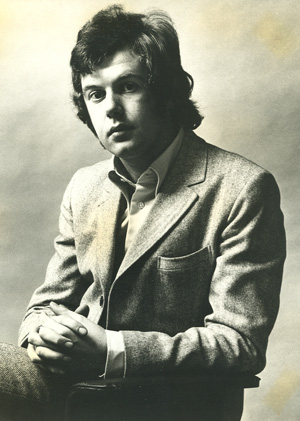 A basic 8 track recording studio was made available on the 1st floor of DJM's New Oxford Street premises for unlimited use. DJM balance engineers gained a reputation for working through nights, a practice initiated to avoid interrupting DJM's 9-5 office staff. Session musicians would often call in and a good deal of experimenting took place both musically and with prohibited substances. The results, however were often unusual and sometimes commercial. (For instance, the hilarious "Troggs tape" was circulated among musicians for many months before it reached a wider public.) DJM's greatest success was with pianist/songwriter Reg Dwight who changed his name to Elton John and teamed with lyricist Bernie Taupin. His unprecedented success was to dominate DJM Records until he left to record for his own Rocket Records, formed in 1973. A basic 8 track recording studio was made available on the 1st floor of DJM's New Oxford Street premises for unlimited use. DJM balance engineers gained a reputation for working through nights, a practice initiated to avoid interrupting DJM's 9-5 office staff. Session musicians would often call in and a good deal of experimenting took place both musically and with prohibited substances. The results, however were often unusual and sometimes commercial. (For instance, the hilarious "Troggs tape" was circulated among musicians for many months before it reached a wider public.) DJM's greatest success was with pianist/songwriter Reg Dwight who changed his name to Elton John and teamed with lyricist Bernie Taupin. His unprecedented success was to dominate DJM Records until he left to record for his own Rocket Records, formed in 1973.
Phillip's first three DJM albums, ("Rehearsal" DJLPS 411, "I think I'll write a song" DJLPS 416 and "Songfall" DJLPS 425) released during 1971 and '72, were each delayed as DJM Records coped with it's international success. Nevertheless the albums found critical acclaim and individual songs from them such as Buddy Holly's "Everyday" (DJS 261) and "Leon" (also recorded later by Roger Daltrey "Ride a rock horse" LP on Polygram) were much played on radio. His fourth LP, "Phillip Goodhand-Tait" (DJLPS 432) released in 1973 after he had returned from an arduous tour of America, along with the single ("You are") taken from it, were extensively promoted by DJM and even advertised on TV, unprecedented at that time. Unfortunately, a strike at the record pressing plant however, meant that there were no records available in the shops to buy, when this marketing spend was taking place! The single "You are" (DJS 278)was judged to be a turntable hit, and though follow-up singles were released, his contract with DJM Records expired. For Phillip, the time had come to change record company and management.
For a bizarre few months, he was actually managed by Bostonian, Lloyd Grossman and during that time he signed to Chrysalis Records, a company owned by Chris Wright and Terry Ellis. Both Terry Ellis and Chris Wright began music careers, (after time as Social Secretaries at their Universities,) by managing and booking bands such as Jethro Tull and Ten Years After helped by ace booker Dave Robson who also coined the name "Jethro Tull".
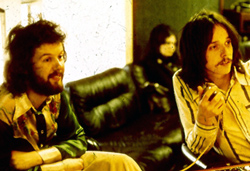 Phillip's first album for Chrysalis was "Oceans away" (CHR 1113) and again, the title single taken from it, was well received. Once again though, Phillip was to find it more lucrative when Roger Daltrey, singer with the Who, recorded Oceans away on his solo album, "Ride a rock horse"(Polydor 2442135). On Roger's next album, "One of the boys" (Polydor 2441146), there were two of Phillip's songs ("Leon and "Parade"). Phillip's 2nd Chrysalis album, "Teaching an old dog new tricks", although produced by Muff Winwood, (ex Spencer Davis Group), was considered to be over-produced to Phillip's ears, and over-costly to Chrysalis. They decided to part company. Phillip's first album for Chrysalis was "Oceans away" (CHR 1113) and again, the title single taken from it, was well received. Once again though, Phillip was to find it more lucrative when Roger Daltrey, singer with the Who, recorded Oceans away on his solo album, "Ride a rock horse"(Polydor 2442135). On Roger's next album, "One of the boys" (Polydor 2441146), there were two of Phillip's songs ("Leon and "Parade"). Phillip's 2nd Chrysalis album, "Teaching an old dog new tricks", although produced by Muff Winwood, (ex Spencer Davis Group), was considered to be over-produced to Phillip's ears, and over-costly to Chrysalis. They decided to part company.
Singer-songwriters were no longer in vogue. Phillip invested his songwriting income in a recording company, Gundog Records, named after his pet spaniel. The 1980 album, "Good old Phill's" and a single "Fly me to the sun" were all he released of his own recordings although in 1983, Gundog licensed two singles for release in Germany. ("Heartbeat" and "He'll have to go").
During the '80s, Phillip began to pursue new interests, adding music publishing experience, to the UK's first video software distribution company, VCL. VCL thrived until it was sold and became Richard Branson's Virgin Video. In 1983, in partnership with Trilion camera and studio facilities, he formed Trilion Pictures to originate music programming for TV and video. The Trilion companies were to become a plc but as the '80s progressed, over-expansion and property speculation was to dent the plc's ambition. By 1985 Phillip owned other independent, TV programme production companies in the UK and USA. By 1989 he had produced an impressive variety of artists "live in concert" including Placido Domingo, Judie Tzuke, Steve Harley & Cockney Rebel, Gary Numan, Kid Creole and the Coconuts, the Blowmonkeys, Uriah Heep, UK Subs, Steve Marriott, U.F.O, Nazareth, the Fabulous Thunderbirds, Sandie Shaw, Darts, The Belle Stars, Steppenwolf, Lee Aaron, John Martyn, Carlene Carter, Greg Allman, Leon Russell, Dr.John, Ten Years After, Alexis Korner and Wishbone Ash, as well as documentary programmes about steam trains, snooker players, cricketers and several popular classical music programmes, programmes he still owns today. He had created a valuable library and an interesting archive but TV production schedules were exhausting. Phillip had little time for performing and recording his own music, however he contributed to several TV programmes and composed music to accompany some of his own television productions. Nothing more publicly was heard of him for the next ten years.
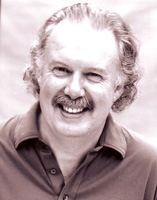 The 1990's saw Phillip starting a new multi media venture, built around a children's character named "Green Ted". Green Ted was conceived to appeal to children between the ages of two and seven. The story begins with a teddy bear, discarded for not being brown! Noted children's book illustrator, Toni Goffe, produced drawings to accompany the Goodhand-Tait narrative, opening yet another chapter in a most interesting, artistic and creative life. The 1990's saw Phillip starting a new multi media venture, built around a children's character named "Green Ted". Green Ted was conceived to appeal to children between the ages of two and seven. The story begins with a teddy bear, discarded for not being brown! Noted children's book illustrator, Toni Goffe, produced drawings to accompany the Goodhand-Tait narrative, opening yet another chapter in a most interesting, artistic and creative life.
Meanwhile, with no pressure on him to perform commercially, Phillip Goodhand-Tait chose to play keyboards and sing, with musician friends such as arranger Robert Kirby, a string quartet and make occasional solo performances.
Technology changes provided new impetus and by 2000, Phillip was songwriting and thinking about recording afresh using his Yamaha keyboards and digital recording techniques.
The catalyst came on Sunday 8th June 2003 when legendary Guildford bands of the '60s were invited to reform and perform again to mark the closure of Guildford's Civic Hall, a venue the Stormsville Shakers had opened some 40 years previously.
So it was that in 2003, the original Stormsville Shakers took to the stage at Guildford, Surrey's Civic Hall. (see Surrey Advertiser review 20th June 2003.) With strong support from the local Surrey Advertiser newspaper, the event was a sell-out success. The Stormsvilles (Phillip on vocals and piano, with founder members Ivor Shackleton, guitar and Kirk Riddle, bass together with tenor saxes 'Greg' McGregor and David Sherrington and replacement drummer, Jim Norris) then followed this with several more engagements.
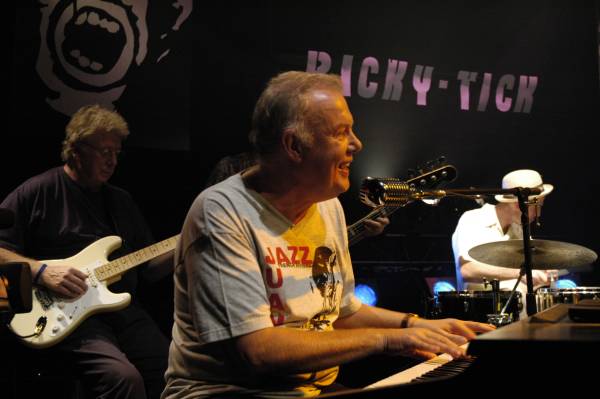 Inevitably an album had to follow and in 2005, Phillip Goodhand-Tait and the Stormsville Shakers, now augmented with baritone sax, trumpet and girl back-up vocalists, recorded 9 of Phillip's songs plus a new song written by Angaleena Presley. The resulting release was the CD "Ricky-Tick...40 years on" celebrating the famous clubs that spawned so many successful British "Beat" musicians. Inevitably an album had to follow and in 2005, Phillip Goodhand-Tait and the Stormsville Shakers, now augmented with baritone sax, trumpet and girl back-up vocalists, recorded 9 of Phillip's songs plus a new song written by Angaleena Presley. The resulting release was the CD "Ricky-Tick...40 years on" celebrating the famous clubs that spawned so many successful British "Beat" musicians.
Another circle was squared when Phillip produced a TV version of the Ricky-Tick album, featuring a re-creation of a Ricky-Tick club venue, this time at Shepperton Studios. The one hour programme also featured guest performers The Yardbirds and Zoot Money who performed "R.C.T (random, chaos theory)", one of Phillip's new songs.
New songs and further recordings are being planned so that solo and Stormsville albums, singles and dvds featuring Phillip's talent should follow. In the meantime, as Phillip says, "I've had the luckiest breaks and known some wonderful people during my life. With three marriages, four children, and grandchildren too, life is never going to be dull but music has been a constant companion, one which I hope to have with me until the end of my life".
TO BE CONTINUED!
© 2006 P Goodhand-Tait.
No part or whole of the above may be copied or reproduced without the prior written permission of the copyright holder, P Goodhand-Tait
P Goodhand-Taitcan be contacted at e-mail: info@phillipgoodhand-tait.com
<<top of the page>>
|

 In 1960, Phillip was asked to "supply a five-piece band for two half-hour periods of playing at a dance" in Woking for a fee of £4. The Surrey Advertiser newspaper, reviewing the first meeting of Sandhurst Youth Club in 1961, recorded that music was provided by Phil Tone and the Vibrants "from Guildford and only six weeks old"!
In 1960, Phillip was asked to "supply a five-piece band for two half-hour periods of playing at a dance" in Woking for a fee of £4. The Surrey Advertiser newspaper, reviewing the first meeting of Sandhurst Youth Club in 1961, recorded that music was provided by Phil Tone and the Vibrants "from Guildford and only six weeks old"! He was inspired to write songs after working with talented songwriter Chris Andrews. Chris, already writing successfully for Adam Faith, brought the Shakers an idea for a song, lyrics sketched on the back of a cornflakes packet. The band worked on the song, arranging it for two saxes and Chris introduced an on-beat, ska-type rhythm, which was familiar in Blue-Beat clubs frequented by 'mods' at that time. The song was well-received by audiences even in the critical, black, All-Nighter clubs. Chris financed a recording at Regent Sound studios and the Shakers knew they had found their hit record. All that was needed was a record company to release it. Soon after however, Chris came to see them, embarrassed after meeting with his agent and manager, Evy Taylor. "Why give the song to an unknown group?" he'd been told. Phill and the Stormsville Shakers, though bitterly disappointed, continued to perform the song around the clubs in the vain hope that somehow their version would be first to be released. During a four nights-for-£90 booking at Pete Stringfellow's Mojo Club in Sheffield, Sandie Shaw's version of the song, "Long Live Love" was released and in May 1965 it became her biggest success, a number one record in the UK Top 10.
He was inspired to write songs after working with talented songwriter Chris Andrews. Chris, already writing successfully for Adam Faith, brought the Shakers an idea for a song, lyrics sketched on the back of a cornflakes packet. The band worked on the song, arranging it for two saxes and Chris introduced an on-beat, ska-type rhythm, which was familiar in Blue-Beat clubs frequented by 'mods' at that time. The song was well-received by audiences even in the critical, black, All-Nighter clubs. Chris financed a recording at Regent Sound studios and the Shakers knew they had found their hit record. All that was needed was a record company to release it. Soon after however, Chris came to see them, embarrassed after meeting with his agent and manager, Evy Taylor. "Why give the song to an unknown group?" he'd been told. Phill and the Stormsville Shakers, though bitterly disappointed, continued to perform the song around the clubs in the vain hope that somehow their version would be first to be released. During a four nights-for-£90 booking at Pete Stringfellow's Mojo Club in Sheffield, Sandie Shaw's version of the song, "Long Live Love" was released and in May 1965 it became her biggest success, a number one record in the UK Top 10. Speciality Record's, piano-pounding rock 'n' roll legend, Larry Williams, embarked on his first British tour ten years after successes with r'n'r classics such as "Dizzy Miss Lizzy", "Short Fat Fannie" and "Bony Maronie". Larry brought with him Johnny 'Guitar' Watson from the States, but he needed a UK backing band. Phill and the Stormsville Shakers got the job, and played their hearts out. Their reward was two days and nights recording two albums with Larry Williams at Decca Records (Decca LK 4691) and in the Marquee club recording studio. They were paid £200 in total and weren't even credited on one of the LPs, released on the Sue label (Sue ILP 922). Larry wrote to Phillip from Los Angeles and expressed his disappointment. Speciality Records in America meanwhile, enjoyed greater success with recordings by his stable-mate, Little Richard.
Speciality Record's, piano-pounding rock 'n' roll legend, Larry Williams, embarked on his first British tour ten years after successes with r'n'r classics such as "Dizzy Miss Lizzy", "Short Fat Fannie" and "Bony Maronie". Larry brought with him Johnny 'Guitar' Watson from the States, but he needed a UK backing band. Phill and the Stormsville Shakers got the job, and played their hearts out. Their reward was two days and nights recording two albums with Larry Williams at Decca Records (Decca LK 4691) and in the Marquee club recording studio. They were paid £200 in total and weren't even credited on one of the LPs, released on the Sue label (Sue ILP 922). Larry wrote to Phillip from Los Angeles and expressed his disappointment. Speciality Records in America meanwhile, enjoyed greater success with recordings by his stable-mate, Little Richard. During 1967 and 68, the last rites for Phillip Goodhand-Tait & the Stormsville Shakers involved a name change to Circus. Mike d'Abo, who had replaced Paul Jones as lead singer in the Manfred Mann group, agreed to finance and produce Circus for two more single releases. The first (Parlophone R5633) was a Goodhand-Tait composition "Gone are the songs of yesterday" which was to prove more lucrative as 'B' side of Love Affair's number one hit "Everlasting love". The second, comprising two PG-T songs in psychedelic vein, ("Do you dream" and "House of wood" Parlophone R 5672), marked Phillip's final appearance with the group from Guildford for many, many years.
During 1967 and 68, the last rites for Phillip Goodhand-Tait & the Stormsville Shakers involved a name change to Circus. Mike d'Abo, who had replaced Paul Jones as lead singer in the Manfred Mann group, agreed to finance and produce Circus for two more single releases. The first (Parlophone R5633) was a Goodhand-Tait composition "Gone are the songs of yesterday" which was to prove more lucrative as 'B' side of Love Affair's number one hit "Everlasting love". The second, comprising two PG-T songs in psychedelic vein, ("Do you dream" and "House of wood" Parlophone R 5672), marked Phillip's final appearance with the group from Guildford for many, many years. A basic 8 track recording studio was made available on the 1st floor of DJM's New Oxford Street premises for unlimited use. DJM balance engineers gained a reputation for working through nights, a practice initiated to avoid interrupting DJM's 9-5 office staff. Session musicians would often call in and a good deal of experimenting took place both musically and with prohibited substances. The results, however were often unusual and sometimes commercial. (For instance, the hilarious "Troggs tape" was circulated among musicians for many months before it reached a wider public.) DJM's greatest success was with pianist/songwriter Reg Dwight who changed his name to Elton John and teamed with lyricist Bernie Taupin. His unprecedented success was to dominate DJM Records until he left to record for his own Rocket Records, formed in 1973.
A basic 8 track recording studio was made available on the 1st floor of DJM's New Oxford Street premises for unlimited use. DJM balance engineers gained a reputation for working through nights, a practice initiated to avoid interrupting DJM's 9-5 office staff. Session musicians would often call in and a good deal of experimenting took place both musically and with prohibited substances. The results, however were often unusual and sometimes commercial. (For instance, the hilarious "Troggs tape" was circulated among musicians for many months before it reached a wider public.) DJM's greatest success was with pianist/songwriter Reg Dwight who changed his name to Elton John and teamed with lyricist Bernie Taupin. His unprecedented success was to dominate DJM Records until he left to record for his own Rocket Records, formed in 1973. Phillip's first album for Chrysalis was "Oceans away" (CHR 1113) and again, the title single taken from it, was well received. Once again though, Phillip was to find it more lucrative when Roger Daltrey, singer with the Who, recorded Oceans away on his solo album, "Ride a rock horse"(Polydor 2442135). On Roger's next album, "One of the boys" (Polydor 2441146), there were two of Phillip's songs ("Leon and "Parade"). Phillip's 2nd Chrysalis album, "Teaching an old dog new tricks", although produced by Muff Winwood, (ex Spencer Davis Group), was considered to be over-produced to Phillip's ears, and over-costly to Chrysalis. They decided to part company.
Phillip's first album for Chrysalis was "Oceans away" (CHR 1113) and again, the title single taken from it, was well received. Once again though, Phillip was to find it more lucrative when Roger Daltrey, singer with the Who, recorded Oceans away on his solo album, "Ride a rock horse"(Polydor 2442135). On Roger's next album, "One of the boys" (Polydor 2441146), there were two of Phillip's songs ("Leon and "Parade"). Phillip's 2nd Chrysalis album, "Teaching an old dog new tricks", although produced by Muff Winwood, (ex Spencer Davis Group), was considered to be over-produced to Phillip's ears, and over-costly to Chrysalis. They decided to part company. The 1990's saw Phillip starting a new multi media venture, built around a children's character named "Green Ted". Green Ted was conceived to appeal to children between the ages of two and seven. The story begins with a teddy bear, discarded for not being brown! Noted children's book illustrator, Toni Goffe, produced drawings to accompany the Goodhand-Tait narrative, opening yet another chapter in a most interesting, artistic and creative life.
The 1990's saw Phillip starting a new multi media venture, built around a children's character named "Green Ted". Green Ted was conceived to appeal to children between the ages of two and seven. The story begins with a teddy bear, discarded for not being brown! Noted children's book illustrator, Toni Goffe, produced drawings to accompany the Goodhand-Tait narrative, opening yet another chapter in a most interesting, artistic and creative life. Inevitably an album had to follow and in 2005, Phillip Goodhand-Tait and the Stormsville Shakers, now augmented with baritone sax, trumpet and girl back-up vocalists, recorded 9 of Phillip's songs plus a new song written by Angaleena Presley. The resulting release was the CD "Ricky-Tick...40 years on" celebrating the famous clubs that spawned so many successful British "Beat" musicians.
Inevitably an album had to follow and in 2005, Phillip Goodhand-Tait and the Stormsville Shakers, now augmented with baritone sax, trumpet and girl back-up vocalists, recorded 9 of Phillip's songs plus a new song written by Angaleena Presley. The resulting release was the CD "Ricky-Tick...40 years on" celebrating the famous clubs that spawned so many successful British "Beat" musicians.